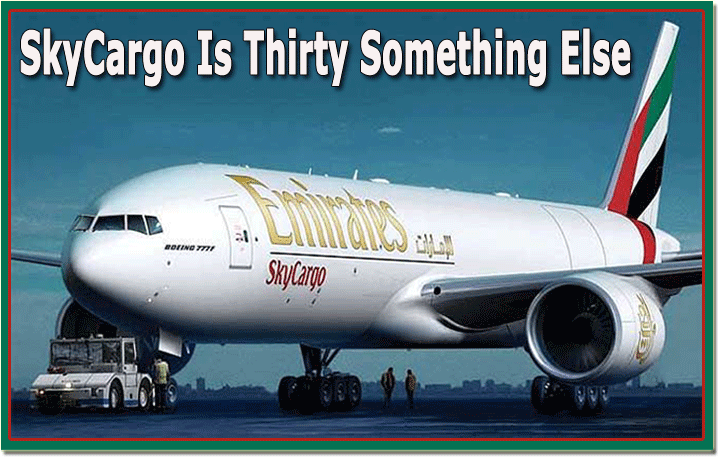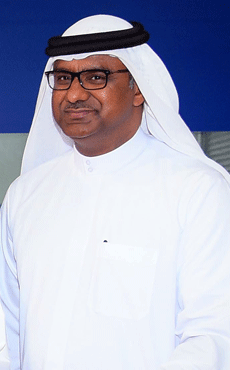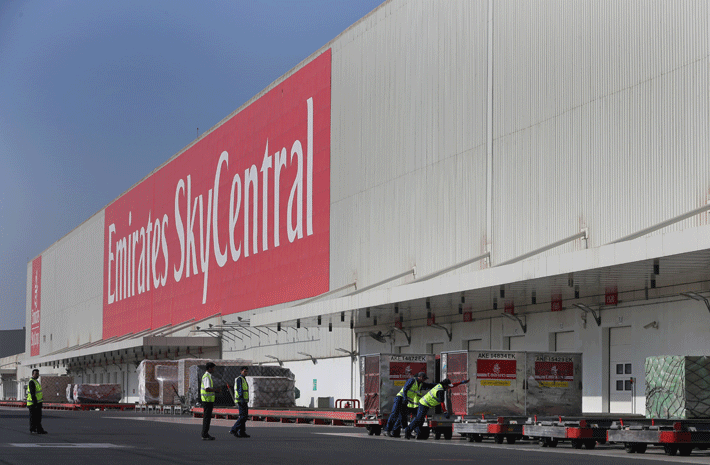
 Nabil
Sultan is sitting in a comfortable room downstairs
inside the big Emirates SkyCargo presentation at
TIACA Paris on October 4. Nabil
Sultan is sitting in a comfortable room downstairs
inside the big Emirates SkyCargo presentation at
TIACA Paris on October 4.
SkyCargo’s Divisional
Senior Vice President (DSVP) burst upon the global
air cargo scene just two and a half years ago as
Emirates’ first head of air cargo.
He has guided a giant
enterprise with a deft hand and cool yet engaged
management style that has grown and evolved at every
step.
Today Emirates is
the number one largest international combination
air cargo airline in the world.
“We are here
(in Paris) to advance understanding and cooperation
with our service partners and also extend our offering
to everyone in air cargo,” Nabil Sultan said.
“Our product
offering is varied, well studied, and is the result
of utilizing our global route network and multiplicity
of flights into the world’s leading gateways.”
Pharma
Lights Up The Future
“In cooperation
with research institutes and leading suppliers,
we've developed the latest technology in temperature-controlled
cargo solutions to preserve the product quality
and integrity of temperature sensitive pharmaceutical
and healthcare products from numerous destinations
in the world via hub Dubai.
“This includes
our state-of-the-art warehouses both at Dubai World
Central, where we operate our freighters, and also
at Dubai International Airport, serving the entire
combination fleet of all widebody aircraft,”
Nabil Sultan declared.
Into
the Thirties
Although it may be
hard to believe, Emirates is now approaching its
32nd year in business. The Prince of Dubai founded
Emirates with a few leased in airplanes from Pakistan
International Airways on March 25, 1985.
During the ensuing
years EK rewrote aviation history, first as a babe
(albeit classy and self-confident) in the airways,
then opening service to the world as a teenager,
roaring during its 20s into a world power in aviation,
and now in its 30s as a global leader against which
others are measured.
The Dubai-based powerhouse
has been a total class act in the airline business.
It has climbed steadily into the heavens and ranks
skyward in every department of the airline experience.
Good
Old Days Good And Gone
It is easy to wax
poetic about the good old days of aviation and what
it was like to fly air cargo or passenger when flight
numbers included less than 100 people onboard.
What is realized immediately
in viewing Emirates or, better still, in experiencing
their services, is how this carrier has changed
the airline business forever.
Today Emirates SkyCargo
operates a fleet of 15 dedicated freighters—13
Boeing 777-Fs and two B747-400ERFs—out of
its Emirates SkyCentral freighter hub at Dubai World
Central, in addition to its combined passenger and
belly service out of Dubai International Airport
(DXB).
Look
Out For Number One
“We are the
world’s largest international cargo airline
because at SkyCargo everything is important to us—each
customer, every flight.
“True, we aim
high,” Nabil Sultan said, “but exceeding
expectations is what drives our place in the market.
“For example,”
Nabil points out, “anybody can put aircraft
into service, but the Emirates difference is thoughtful
expansion.
“That means
we enter a market with a plan, including investment
and time for things to develop and blossom.
“Just last month
we expanded our presence in Scandinavia with the
launch of a new weekly B777 freighter service from
Oslo to Dubai that commenced October 11, 2016.
“The cargo capacity
adds both lift and flexible load capability in addition
to the 175 tons of belly hold capacity offered on
the 5 weekly Boeing 777-300ER passenger flights
from Oslo.
“We have seen
seafood exports double from Norway during the past
decade.”
 |
Gateway
Spectacular
Emirates SkyCargo’s
state of the art facilities at its Emirates SkyCentral
freighter hub at Dubai World Central leans into
the plan quite well, especially for pharma and the
transportation of temperature-sensitive seafood
shipments.
Quick two-way connections
occur from the freighter hub at DWC and DXB, where
all the combination aircraft offer a transit time
of just 5 hours between arrival of goods at Dubai
World Central and their departure on belly hold
capacity in passenger flights from Dubai International
Airport.
That adds up to lightning
fast connections to over 150 destinations across
82 countries in 6 continents across the world.
Mostly
Nabil
Most impressive to
us personally is the emergence of Nabil Sultan.
Shortly after Nabil
Sultan appeared on the world stage as Emirates’
“newly appointed Divisional Senior Vice President,
Cargo July 1, 2013,” he headed to the United
States to meet staff and customers.
We met up with him
at SkyCargo John F. Kennedy International Airport
before that fateful exercise got underway.
At the time, the presser
from EK stated that Nabil was an Emirati educated
in the U.S., so our spirits and expectations were
raised about the opportunity to work with a native
UAE person in commercial aviation.
It became clear very
quickly as we spoke with him that he was a man of
considerably more grit and substance than that of
a token appointee or someone who was just in the
right place at the right time.
While reserved, quiet,
and even studious, Nabil is also quite the cool
customer.
Smart, refined, and
always listening more than speaking, Nabil did not
appear to be the least bit intimidated about inhabiting
the top spot of the biggest emerging international
airline in the world.
By charting his own
course and believing in himself and his team, Nabil
has emerged as a force indistinguishable from SkyCargo
itself as the Dubai air cargo juggernaut continues
its torrid growth in international air commerce.
Directing focus on
the product rather than the man might turn out to
be the smartest thing Nabil Sultan could have done.
But you don’t
have to talk to him very long before Nabil Sultan
is telling you through his actions to “watch
what I do.”
Nabil has remained
tasked towards keeping priorities straight, including
the well-publicized movement of the entire 14-freighter
fleet to the new Dubai World Central Al Maktoum
International Airport.
Less
Than Zero
“It has taken
some time to get everything into place, but now
SkyCargo is ready with the finest cool-chain operation
in the world.
“Our GDP-compliant
operations are biggest in the world.
“It’s
little wonder that our numbers in the sector continue
to grow.
“We expect to
continue increasing our activities in 2016 after
witnessing a 23 percent growth in 2015.
“Today Emirates
has invested and refined our activities in a cold
chain operation that has broken the myth of shipping
and hubbing pharma via an airline operating in the
desert.
“In terms of
percentages, the chance of exposure to outside temperatures
via any Emirates SkyCargo cool chain movement is
less than zero,” Nabil Sultan said.
A
Team Effort
“As we have
progressed in the air cargo business Emirates has
scoured the earth for the best and brightest people
for key positions up and down the line.
“I am confident
that from Chicago to Zimbabwe we have fielded the
finest team in the air cargo business.
“‘The
best surprise is no surprise,’ describes our
operation, where Emirates Sky Chain technology provides
complete transparency to every air cargo movement.
“But having
the correct information goes hand in hand with the
human touch of letting everyone know what to expect
in every step of the shipping process,” Nabil
Sultan said.
About
Freight Forwarders
“Freight Forwarders,”
said Nabil Sultan, “are an essential part
of the logistics chain in ensuring end-to-end offerings
to customers.
“Forwarders
are important partners to Emirates SkyCargo in delivering
value to our customers.
“We work through
a closely integrated model with freight forwarders
globally—this includes integrating some of
our largest forwarding partners as part of our sales
structure.
“Emirates believe
that as part of a successful partnership it is important
to have a tripartite dialogue with the end customer
in order to deliver maximum value.”
It’s
About Commitment
“Emirates SkyCargo
is committed to being a facilitator of global trade
flows, offering cargo hold capacity on our fleet
of more than 250 aircraft, including 15 dedicated
freighters, 13 Boeing 777-Fs, and 2 B747-400ERFs.
“With an unrivalled
route network, we connect cargo customers to over
150 cities in 82 countries on 6 continents and operate
in many of the world’s fastest developing
markets.
“Emirates SkyCargo
will continue to adhere to its policy of excellence
in every area of operation in the years to come.
“Given the constantly
changing landscape of the global air cargo industry,
we can truly be an agile global partner to freight
forwarders with our current set up, allowing for
a ‘win-win’ solution through mutual
cooperation.”
Driving
Partnerships
“In the past,
the partnership between airlines and freight forwarders
has largely been driven by the rate offering.
“Although still
important, there are other factors that can help
drive value and efficiency in the relationship,
such as the strength and reach of the network of
the airline.
“For example,
as the single largest operator of the B777 and an
all wide body fleet, we offer seamless freight transfer
across our entire network. Emirates SkyCargo also
offers customized solutions for our freight forwarding
partners that allows them to be in better control
of the shipping process, and we see this as an important
driver for the future of the partnership.
“We truly challenge
traditional forwarding models by using alternative
solutions, which are fast and more reliable in performance,
without jeopardizing the value of the consolidation.”
Carrying
Things Farther
“It is very
important,” says Nabil Sultan, “for
the airline and freight forwarder to understand
each other’s strengths and unique offerings
and see how that can be used for mutual benefit.
“There can be
no one recommended ‘one size fits all’
solution for a successful partnership as every case
is unique.
“It is essential
for the two parties to work closely together to
identify the best arrangement,” Nabil concluded.
Geoffrey |





